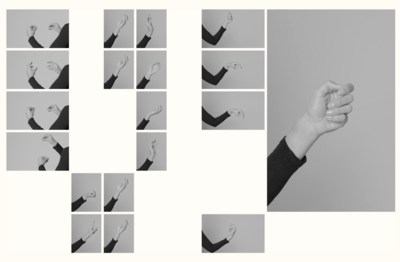Article
From softwear.directory
Jump to navigation
Jump to search
⤢ a directory that gathers, stacks and links practices that work with, through and beyond (digital) fashion […]
LATEST UPDATE 26.09.2025
[003]
The Cell for Digital Discomfort (CfDD)
Collective
critical
Formed as part of the 2021/2022 BAK Fellowship for Situated Practice, the Cell for Digital Discomfort (CfDD)—composed of Cristina Cochior, Karl Moubarak, and Jara Rocha—are the guest editors of this special Prospections focus “Digital Discomfort,” a compilation of newly commissioned and archival resources such as texts, interviews, and videos that allow for a collective exploration of sensibilities around an affirmative repoliticization and redefinition of compu-relational practice.
04.03.26
[004]
Multidimensional citation
Collective
speculative
At the start of 2020 we announced our collaboration by sending around a postcard. Three women in stone-colored clothing sat on the ground, our faces staring directly into the camera in a diagonal cascade. The postcard also contained a link to our website where we described ourselves and our collaboration.
Our differences allowed us to come together in a complementary way. An alliance of islands intuitively felt like our symbol: and for this reason we used three dots cascading ⋱ for our website’s favicon — the small icon that appears near the web browser’s address bar.
“A citation should not be singular, but instead explicitly connected to the lineage of research that came before it.”
04.03.26
[026]
“Trust Us, We’re You”: Aspirational Realness in the Digital Communication of Contemporary Fashion and Beauty Brands
Individual
critical
In recent years, a number of fashion and beauty brands have developed promotional content that circulates an aspirational quality imbued with unstudied “cool” around their product. Despite the appeal of this conceit to tropes of the everyday, authenticity, and belonging, it presents a superficially relatable ideal whilst exploiting digital media’s capacities to foster intimacy and promote a postfeminist subjectivity based on consumption.
This article examines three brands that circulate “aspirational realness” around their product: Glossier, Reformation, and Maryam Nassir Zadeh. All remediate the conventions of prior fashion media to communicate discourses of neoliberal femininity to a media-savvy consumer. Aspirational realness is thus read as a means by which consumption is both encouraged and situated as a means of self-realization in the likeness of other aspirational “cool girls.”
04.03.26
[074]
Your Internet Browser Does Not Belong to You
Individual
critical
In the The WIRED article Showler explores how browsers not only serve as gateways to the internet but also influence the way we think, act, and are surveilled online. It examines how features like tabs and private search, initially intended to enhance user experience, reflect and shape our fractured attention spans and desire for privacy. However, the browser’s underlying mechanics, such as tracking and personalized responses to user behavior, expose the tension between browsing as a free, casual act and its deep ties to commercial and surveillance interests. Ultimately, it argues that browsers subtly dictate how we interact with digital spaces, challenging notions of neutrality and autonomy in online environments.
“To use a browser is, directly or indirectly, to participate in commerce. No act of browsing is ever really idle.”
04.03.26
[076]
Coded Gestures
Collaboration
speculative

Coded Gestures, Sanne van den Elzen
In form of a short research paper, Maughan explores the evolution and potential of hand gestures in human-computer interaction, particularly in the context of emerging spatial computing technologies. The paper reflects on the historical significance of hand representations, such as ancient cave paintings, and examines how our hands have co-evolved with tool use over millennia. It critiques the current design of hand gestures in technology, like Apple's double tap, as mere extensions of existing interactions, and advocates for reimagining hand-based interactions to fully harness the capabilities of spatial computing.
Maughan lays out how gestures serve as both a bridge and a blueprint for future embodied technologies, shaping how we interact beyond screens and devices. As spatial computing evolves, gestures could inspire more fluid, intuitive interfaces that dissolve the boundaries between digital and physical spaces. Their design must embrace cultural diversity, ergonomic fluidity, and emotional expressivity to create meaningful, adaptive interactions. By moving beyond prescriptive, pre-defined gestures, future formats of embodied technology can foster a more symbiotic relationship between humans and machines—one where interaction feels as instinctive as movement itself.
“Annie Murphy Paul notes how gestures help us pin down vague thoughts, offering a “proprioceptive hook” that distributes cognitive load and assists memory. Gestures accompany everyday speech. They replace it when we lack a shared language, or when speech becomes
inaudible or dangerous.”
04.03.26
[082]
A feminist server stack: co-designing feminist web servers to reimagine Internet futures
critical
This paper explores the idea of a "feminist server stack," which challenges traditional, centralized internet infrastructure by proposing alternative, community-driven digital spaces. It draws from feminist principles to rethink how digital tools and networks are designed, governed, and used—prioritizing care, consent, and collective control over data. The paper critiques dominant, profit-driven tech ecosystems and imagines new ways of structuring servers, storage, and communication that align with ethical and inclusive values. Ultimately, it advocates for a reimagined digital landscape where technology empowers marginalized voices and fosters more equitable, decentralized, and self-sustaining digital communities.
In reimagining servers as sites of care, A Feminist Server Stack enacts affirmative ethics by centering consent, maintenance, and relationality within digital infrastructure. Through co-design, it resists extractive norms and proposes a situated, collective stack that foregrounds the politics of hosting—where serving becomes an act of feminist world-building.
04.03.26
[SUBMIT]
As the online realm often feels infinite, this directory highlights non-commercial, critical, and experimental online content related (but not limited) to fashion and creative practices. It features projects, essays, visuals, and events, offering tools to navigate this dynamic landscape.
In gathering a wide variety of practitioners and collectives, we are always expanding, and looking to add to this growing bibliography of ‘being online’.
If you've encountered or created something that fits within this scope, feel free to share and submit!
Retrieved from "https://softwear.directory/index.php?title=Article&oldid=1722"